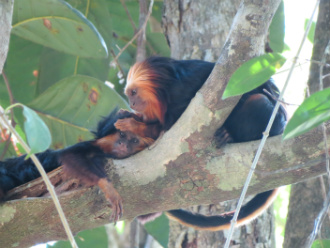Another endangered tamarin gets too close to GLT territory
 Credit: Rodrigo AraujoEndangered species can be threatened by a myriad of problems - including other endangered species! Brazilian scientists are trying to head off introduced golden-headed lion tamarins, a close relative to the golden lion tamarin, before they extend their reach into GLT territory. A number of golden-headed lion tamarins were successfully captured and returned to their native habitat further north in Brazil.
Credit: Rodrigo AraujoEndangered species can be threatened by a myriad of problems - including other endangered species! Brazilian scientists are trying to head off introduced golden-headed lion tamarins, a close relative to the golden lion tamarin, before they extend their reach into GLT territory. A number of golden-headed lion tamarins were successfully captured and returned to their native habitat further north in Brazil.
The full Portuguese article can be found here, and the first part of the article is translated into English below.
GOLDEN-HEADED LION TAMARINS ARE SUCCESSFULLY REPATRIATED
To date 66 individuals have been transported to southern Bahia
Brasilia (22 Mar 2013) – Primate specialists are transferring golden-headed lion tamarins from Niteroi, in the state of Rio de Janeiro, to the South of Bahia, their natural habitat. The action is based on studies that recommend the removal because the species is invasive in Niteroi, habitat of another primate, the golden lion tamarin.
Never before done in Brazil, the operation is necessary to avoid the encounter of the two groups, which would be detrimental to both species. The entire process obeys protocols recommended by international animal protection organizations. All indications are that the golden-headed lion tamarins were introduced in Niteroi accidentally.
To date, 104 individuals were captured. Of these, 66 were transferred to Bahia, 17 are in quarantine and 4 groups (24 animals) who tested positive for diseases are in captivity. The specialists calculate that half the animals have been removed from the Niteroi region. They hope to capture the remainder by the end of the year. In the beginning of March the first young were observed in the groups released in Bahia, a good sign that the golden-headed lion tamarins are adapting to their new area.
The removal program is conducted by the Instituto Pri-Matas in partnership with the National Center for Research and Conservation of Brazilian Primates (CPB), a decentralized unit of the Instituto Chico Mendes de Conservação da Biodiversidade (ICMBio), the Secretariat of the Environment for the State of Rio, the Rio de Janeiro State Environment Institute – INEA, and the Niteroi municipal Secretariats of Environment, Water Resources and Sustainability, and Education. The program has financial support from: Fundação Grupo Boticário de Proteção à Natureza, RBO Energia (through the Chamber of Environmental Compensation of the Environment Secretariat of Rio de Janeiro, the Tropical Forest Conservation Act – TFCA/Funbio, the Lion Tamarins of Brazil Fund, Margot Marsh Biodiversity Foundation/Conservation International, and the MBZ Species Conservation Fund.
